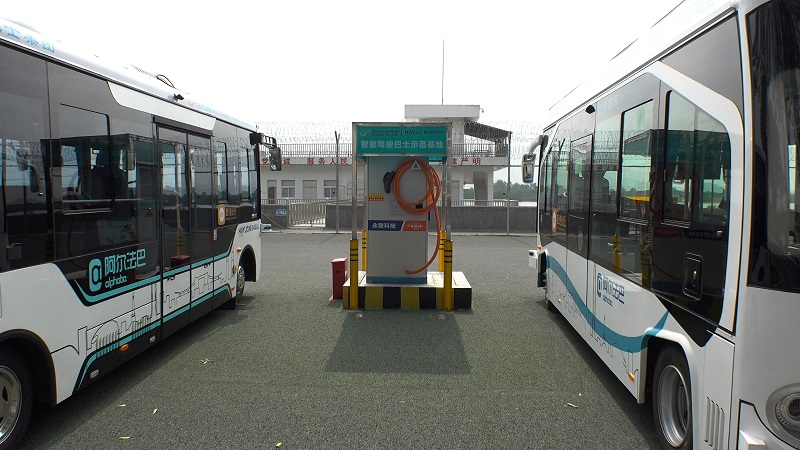BEIJING – At a trade show here for automotive aftermarket products, lubricant companies and industry analysts discussed how to survive declining oil consumption and shifting distribution channels.
Chinas promotion of alternative energy vehicles, mostly electric vehicles, is dragging down automotive lube use, consultant Zhang Chenhui said March 20 at the Auto Maintenance and Repair Expo organized by Messe Frankfurt, Mu Cheng You and two Chinese maintenance associations.

Photo: StreetVJ/Shutterstock
Electric self-driving buses stopped at a charging station in the Futian district of Shenzhen, China. The country’s promotion of alternative energy vehicles, mostly electric vehicles, is dragging down automotive lube use, industry observers say.
Because battery storage still is a big obstacle for vehicles powered purely by battery, mild and plug-in hybrids will remain the most common varieties of EVs for a while, Zhang said.
Hybrid EVs still need lubes for the engine, and there could be opportunities for lube use in other parts like gearbox and shaft, depending on design changes, Zhang said. He suggested lube companies study vehicle designs to get well prepared for the new kind of lube supply.
Sinopec estimates that China will have 495 million passenger cars by 2035, 5 percent of which will be EVs. The China Association of Automobile Manufacturers predicts Chinese drivers will likely buy 1.6 million alternative energy cars in 2019, up 33 percent from 2018.
Zhang advised companies to focus not only on passenger cars, but also alternative energy-powered commercial vehicles like buses.
In recent years, big Chinese cities raced to replace existing diesel-engine powered buses with electric versions. In 2018 alone, Beijing, Shenzhen and Xian switched to electric buses.
According to Beijing-based CCID Consulting, China will continue to roll out alternative energy buses, with pure battery-powered varieties accounting for up to 80 percent of their number. The rest will be hybrids or run on fuel cells.
The use of subway systems, high-speed trains and high quality lubes with longer recommend oil drain intervals are the other reasons for weak automotive lube demand, Zhang said.
Under such circumstances, lube companies and distributors need to change their mindset to survive, said Yang Zhaoping, sales director for automotive lubes at Lukoil. He suggested companies break down product categories for precision marketing.
He took engines as an example as there are about 50 different types of gasoline engines in the market, including Hondas Variable Valve Timing & Lift Electronic Control system, continuously variable valve timing and Audis Turbocharged Direct Injection engine.
Engines differ in operating pressure and temperature, requiring different oils to ensure performance and fuel efficiency. You cannot sell some general grades like API SN 5W-40 or SN 5W-30 to, say, every expensive car. You need to check viscosity varieties for the best recommendation, he said, adding the same goes with industrial clients.
Yang said too many distributors still rely heavily on big brands just for the sake of the brand name.
Big brands continue to evolve, but many of the distributors did not grow along [with them]. They often have poor management skills, with little knowledge about the oils they sell, let alone clients demand. They probably were doing okay in the past, but surely will face great difficulties in the increasingly demanding, competitive market, he said.
Distributors are still very important for lube suppliers to reach clients in the vast, highly fragmented Chinese market, even though new distribution channels like e-commerce and repair stores have become more predominant, Wang Xuguang, general manager at Jiangsu Haixia, said. The company is a Jingjiang, Jiangsu province-based subsidiary for lube businesses of Feoso Group, the energy company based out of Hong Kong.
I saw distributors face a lot of anxieties in recent years, including high inventory levels, high sales targets, increasingly demanding clients and a talent shortage, he said.
While there is always sales pressure, Wang said Lukoil is exploring the ways to build mutual trust with its distributors and help them grow.
Distributors vary in different areas. Some could be as big as chain stores, while some could be small stores run by individuals. But at the end of the day, they all want the same thing – to feel security and be respected, Wang said.